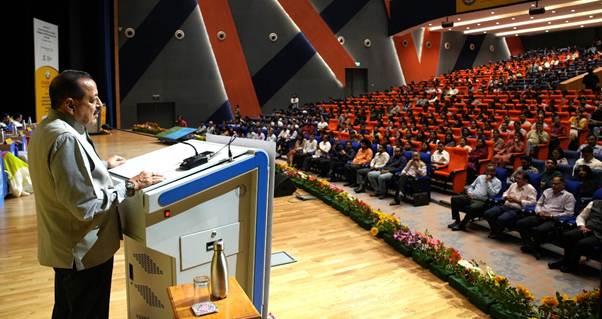Union Minister of State (Independent Charge) for Science and Technology, Dr Jitendra Singh, on Tuesday said artificial intelligence (AI) has the potential to create “miracles” for India’s future, provided it is used with integrity. He cautioned that while AI offers enormous promise, its misuse through deepfakes and misinformation underscores the urgent need for ethical frameworks.
Speaking at the inauguration of a new Centre of Excellence for Artificial Intelligence, Skill Development and Innovation in Dehradun, Singh emphasised that integrity has no technological substitute and must remain the guiding principle for innovation. The centre, spread across 1.5 lakh square feet, is the first such facility in Uttarakhand and marks a significant step in India’s push to integrate AI into governance, research, and industry.
Dr Singh told students and researchers that AI should be seen as a tool to complement human intelligence rather than replace it. He advocated for a hybrid model where technology strengthens human judgment instead of overriding it. “Every tool has a self-limiting utility if integrity is compromised. Only when we combine innovation with honesty can we truly shape India’s digital future,” he said.
Reflecting on India’s recent scientific strides, Singh said the country had moved from being a late adopter of television to becoming a leader in quantum research and space exploration. He highlighted the importance of linking academic research with industry and startups to sustain this momentum.
The minister also cited initiatives from his tenure, including AI-enabled telemedicine vans deployed in rural areas, where hybrid human-AI systems delivered healthcare to villages that had never seen a doctor. He said such examples illustrate how technology, when guided by integrity, can bridge gaps in governance and service delivery.
While lauding the possibilities of AI in governance, Singh warned that without accountability, technology cannot fully address citizens’ expectations. He pointed to the rise of deepfakes and disinformation as proof of how innovation can be weaponised when divorced from ethics.
Agencies, he said, must ensure transparency and responsible practices as AI is integrated into sectors like healthcare, agriculture, environment monitoring, and smart cities.
The newly inaugurated Centre of Excellence has been developed at a cost of over ₹10 crore. It hosts an Apple iOS Development Centre set up in collaboration with Apple and Infosys, as well as Uttarakhand’s first NVIDIA AI and High-Performance Computing facility. Powered by the NVIDIA DGX B200 system with eight GPUs and 1.74 TB GPU memory, the facility is expected to serve as a hub for cutting-edge research in advanced industries.
According to officials, the centre will support a range of projects from improving agricultural yields and developing smart city frameworks to enhancing climate resilience and expanding healthcare access. Researchers and startups are expected to play a central role in translating these efforts into practical solutions.
Singh reiterated that the true test of AI lies not just in its technological power but in how responsibly it is deployed. “Integrity is what makes innovation sustainable,” he said, underlining that the coming decade will be defined not only by technological leaps but also by the ethical choices made by innovators, policymakers, and citizens.
With India positioning itself as a leader in digital technologies, the inauguration of Uttarakhand’s first AI Centre of Excellence signals both a milestone and a responsibility, to ensure that the tools shaping tomorrow’s India remain aligned with accountability and public trust.





